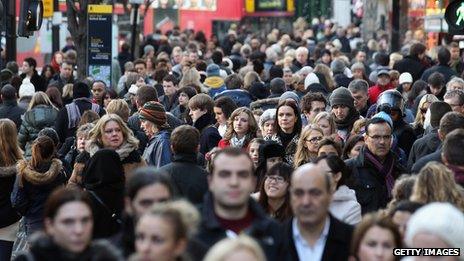Minimum wage up to £6.50 an hour
- Published

A million workers will receive their first real-terms rise for six years
The national minimum wage will increase by 19p an hour to £6.50, the government has announced.
The new rates will be implemented in October and will benefit a million workers.
Business Secretary Vince Cable said he had accepted a recommendation from the Low Pay Commission that the minimum wage should increase by 3%.
It is the first time in six years that the rise will be higher than inflation.
The rate for 18 to 20-year-olds will go up by 10p to £5.13 an hour, a 2% increase.
The rate for those aged 16 and 17 will rise by 7p to £3.79, also a 2% rise.
Apprentices will earn an extra 5p an hour, taking their wages to at least £2.73.
The consumer prices index (CPI) rate of inflation is currently 1.9%.
"The recommendations I have accepted today mean that low-paid workers will enjoy the biggest cash increase in their take-home pay since 2008," said Mr Cable.
'Blunt instrument'
He also suggested that all companies should consider helping their staff to share in the fruits of an improving economy.
"I urge businesses to consider how all their staff - not just those on the minimum wage - can enjoy the benefits of recovery," he said.
Meanwhile, the man who set up the minimum wage 15 years ago, said it is in need of major reform.
Professor Sir George Bain, founding chair of the Low Pay Commission, said the benchmark was a "child of its times" when launched in 1999.
But speaking to BBC Newsnight on Wednesday, he said it had become a "blunt instrument" and that many employers could now afford to pay their workers much more.
"If you set it at the 'living wage', which is about £7.65 an hour, you would cause massive unemployment in areas like retail and social care," Sir George added.
'Special case'
"But there's only about five sectors where this is true. There's a whole range of sectors where you could easily afford to pay more than the minimum wage."
Sir George, who has chaired a review of the minimum wage for think-tank the Resolution Foundation, also said there should be a "special case for London to have a higher national minimum".
His report also recommends that the Low Pay Commission give longer-term forecasts for the benchmark, to help employers plan for the future.
The latest rise means the national minimum wage is still well below the definition of low pay, as set by the Organisation for Economic Co-operation and Development (OECD).
This equates to two-thirds of the median full-time hourly wage - about £7.71 an hour. About five million UK workers currently earn below that level.
The latest figure is also well below the living wage, which is £8.80 per hour in London, and £7.65 in the rest of the country.
"Across the country, people are struggling to make ends meet," said Dave Prentice, the head of the Unison trade union.
"The sooner we move to a living wage, the better," he said.
'Timid'
In January this year, Chancellor George Osborne said he backed the idea of the national minimum wage reaching £7 an hour by October 2015.
The latest announcement could pave the way for that to happen, but it would need a rise of more than 7% next year to do so.
Unite, the country's biggest trade union, said the rise announced was "timid".
"To make matters even worse, George Osborne cruelly held out hope that the rate would rise to £7," said Len McCluskey, Unite's general secretary.
"The government claims it is on the side of working people but companies are sitting on a cash mountain of £500bn and they should be forced to share more of it with the lowest paid," he added.
- Published10 March 2014
- Published21 February 2014
- Published24 January 2014